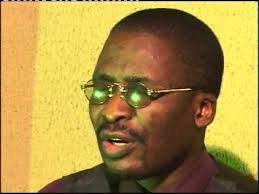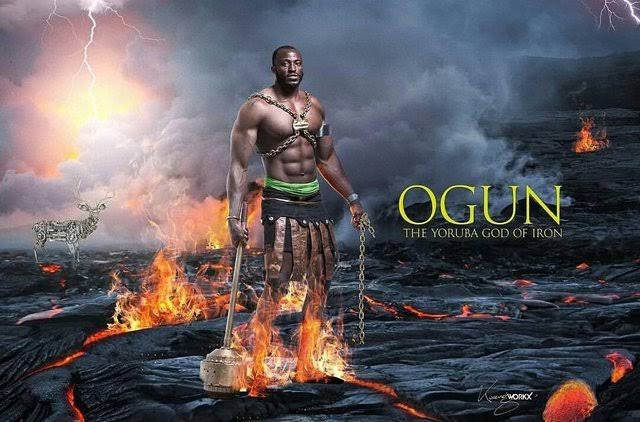
Thomas, born October 1919, died tragically on November 23, 1953, under curious circumstances aged just 34.
A day prior, on November 22, 1953, Bode, who had been made the chairman of the Oyo Divisional Council having taken over from Alaafin Adeyemi II, arrived at a meeting of the council with the Oba (king) in attendance as a member.
The report holds that all the other councillors, except Oba Adeyemi in his 60s, stood to welcome him. Thomas then impolitely told the king “why were you sitting when I walked in? Why can’t you show me respect?”
There was the popular story that the Oba asked him to be barking like a dog and that happened.
The Alaafin, feeling disrespected, asked Thomas “shey emi on gbo mo baun? emi ni ongbo bi aja mo baun” meaning “is it me you are barking at like that?’ is it me you are barking like a dog at like that? keep barking.”
Various accounts further hold that Thomas, upon reaching home after the meeting in Oyo, started barking through the night at his Yaba, Lagos home. He died the following day (November 23, 1953) despite being sent to Ijebu-Igbo for further treatment.
Thomas, being a chief himself, must have known the time-held Yoruba practice of respecting the elderly and traditional authority as he and Alaafin Aderemi II were Yorubas.
However, it appears the two not seeing eye to eye had to do with power-play regarding tax mobilization, political party support and rights of traditional authority.
Political leader Obafemi Awolowo had established the Action Group to wrestle power from the British with Thomas as deputy leader.
The Alaafin, one of the few highly placed men of Yoruba extraction, rather threw his weight behind Nnamdi Azikiwe and the National Council of Nigerians and the Cameroons (NCNC).
There had been a test of powers of sorts with Alaafin on one hand and Awolowo and Thomas on the other. The rift led to banishing of the Oba’s son, the death of Thomas and the dethronement of the Alaafin by Awolowo.
Thomas was Nigeria’s first Minister of Transportation and later Minister of Works. He also served as both a colonial minister of the Colony and Protectorate of Nigeria and a nobleman and privy counsellor of the historic Oyo clan of Yorubaland.
He was Balogun of Oyo – a royal name given to a village’s warhead although it can also mean one who can’t be defeated or conquered. He received the Balogun title in 1949.
Thomas was instrumental in the fight for self-rule against the British serving as a lawyer, politician, statesman and traditional aristocrat.
He was born to Andrew Thomas, a wealthy trader and auctioneer who was originally from Oyo but migrated to Lagos. He studied law in London and was called to the bar in 1942.
He subsequently returned to Nigeria to establish the law firm “Thomas, Williams and Kayode” in 1948, together with Chief Frederick Rotimi Williams and Chief Remilekun Fani-Kayode.
Among his other feats, he became the legal adviser of Egbe Omo Oduduwa in 1946. He was one of the founding members of the Action Group. Prior to joining Action Group, he was a successful Lagos lawyer and was a member of the Nigerian Youth Movement.
With Thomas’ style, he was regarded as brilliant, logical, astute, thoughtful, forward-looking and a workaholic. On the downside, he was viewed as arrogant, hot-tempered and a bully.
Thomas married Lucretia Shobola Odunsi having children Eniola and Dapo together. He was chancellor of the African Church of Nigeria and became a member of Regional House of Assembly in 1951.
The popular ‘Bode Thomas Street’ in Surulere is named after him.
However, Thomas’ personal physician, Dr. Moses Adekoyejo Majekodunmi, revealed what happened in his autobiography, My Lord, What a Morning.
In his words: “When after an hour Bode did not arrive I telephoned him to find out whay was happening. He asked if I could come over to his house, and I did. I met him in the sitting room; and he called his mother and his wife Subo. He told the three of us in the sitting room that he had just returned from Oyo that afternoon. While in Oyo, he developed fever and had wanted to return to Lagos immediately but his driver had taken his car away and was nowhere to be found. So he requisitioned the Native Authority lorry to take him from Oyo to Lagos. He knew that during the journey to Lagos, the fever got worse and he was delirious and he was talking in his delirium and his mother had been very much frightened by this. He just wanted to tell his mother and wife in my presence that should anything happen, such that he was unable to exercise his judgement, no remedy or medicine was to be applied to him or should be given him unless it was approved by me, his friend and physician.”
Below are excerpts from the book, posted by Mayowa Akinsola in The Nigerian Nostalgia, 1960- 1980, Project:
DID BODE THOMAS REALLY BARK TO DEATH? AN ACCOUNT OF HIS LAST DAYS BY HIS PERSONAL PHYSICIAN.
I first met Chief Obafemi Awolowo through my friend Bode Thomas, deputy leader of the Action Group. Bode Thomas was a man whose dull visage hid his incisive, analytical mind and a fiercely objective approach to national issues…
Bode and I became very intimate in the early fifties and went into the timber trade together during the timber boom…
Shortly after that, the Action Group had problems in Oyo town, particularly with the Alaafin of Oyo. Bode Thomas frequented Oyo at this time and towards the end of November 195, Bode telephoned me in my house at No. 2 Force Road, requesting me to send my car to bring him to my house. It was an unusual request but I dispatched the car.
When after an hour Bode did not arrive I telephoned him to find out was happening. He asked if I could come over to his house, and I did. I met him in the sitting room; and he called his mother and his wife Subo. He told the three of us in the sitting room that he had just returned from Oyo that afternoon. While in Oyo, he developed fever and had wanted to return to Lagos immediately but his driver had taken his car away and was nowhere to be found. So he requisitioned the Native Authority lorry to take him from Oyo to Lagos. He knew that during the journey to Lagos, the fever got worse and he was delirious and he was talking in his delirium and his mother had been very much frightened by this. He just wanted to tell his mother and wife in my presence that should anything happen, such that he was unable to exercise his judgement, no remedy or medicine was to be applied to him or should be given him unless it was approved by me, his friend and physician. We all seemed to understand this. That night I gave Bode some anti malaria drugs as well as some sedative.
The following morning being a Sunday, I went to Abeokuta for a family meeting. On my way back, I called at Araoti Street to see Bode Thomas, but as was explained to me later, he had been removed because there were too many visitors. I never saw him again because he died a few days later. Bode was a highly principled man and a loyal friend. His death was greatly felt by me. I had the honour to deliver the funeral oration at his burial and I remember saying: “Bode was too young to die but we mourn today the end of a remarkable achievement no less than the promise yet unfulfilled.” The funeral was very well attended by the people of Lagos, indeed up to that time it was in my view the most well attended funeral in Lagos. The streets were filed and all the way to Ikoyi Road was blocked with traffic.
SOURCES:
Autobiography of Moses Adekoyeko
"My Lord what a morning"
Face2face Africa
Michael Eli Dokosi
Mayowa Akinsola in The Nigerian Nostalgia, 1960- 1980, Project
Punch news
Kindly Share Our Post, Thank you.



.jpeg)

.jpeg)

0 Comments